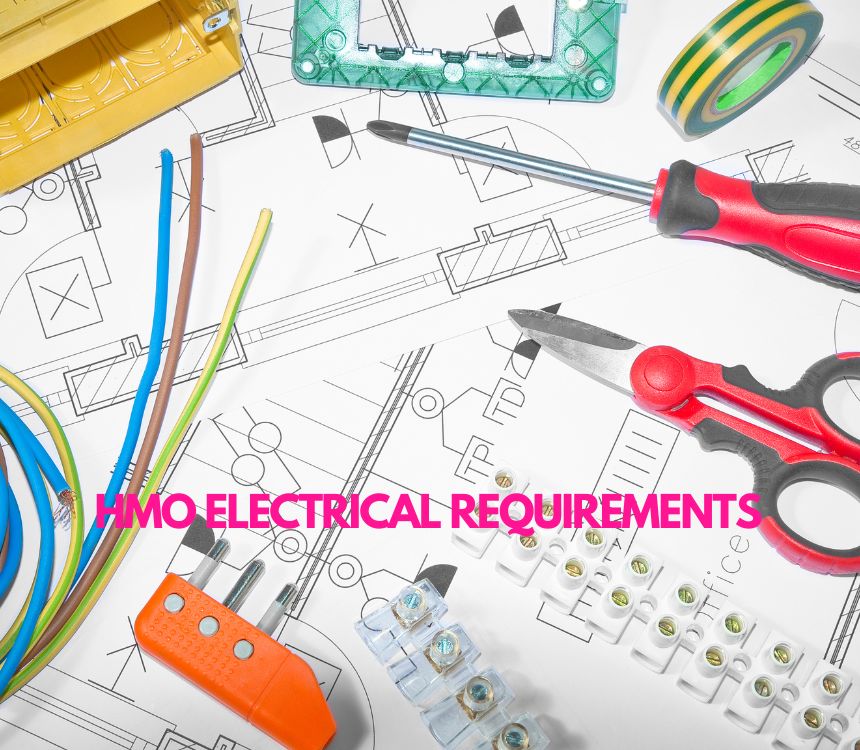HMO Electrical Requirements in the UK: A Comprehensive Guide for Landlords need to publish
When renting out a House in Multiple Occupation (HMO) in the UK, ensuring your property meets all electrical safety requirements is essential. This is not only for the safety of your tenants but also to comply with legal standards, as failure to meet HMO electrical requirements can lead to penalties or even imprisonment. Here, we’ll cover everything you need to know to keep your HMO compliant with UK regulations.
Why Electrical Safety is Crucial in HMOs
Electrical safety is critical in HMOs because of the increased occupancy and use of electrical systems. Overloaded sockets, untested appliances, and neglected wiring can lead to electrical faults, posing risks like fire or electrocution. The UK government has set specific HMO electrical requirements to mitigate these risks and ensure tenant safety.
Get The HMO Landlord Safety Certificates
Ready to keep your HMO compliant? Book an electrical inspection with a quialified electrician now!
HMO property certificates for a Landlord:
Key HMO Electrical Requirements for Landlords
To maintain compliance with electrical safety regulations in an HMO, landlords must meet several key requirements. Below are the main HMO electrical requirements you need to consider:
Electrical Installation Condition Report (EICR)
An Electrical Installation Condition Report (EICR) is a vital requirement for all HMOs. This report assesses the condition of all electrical installations in the property, identifying any defects, deterioration, or non-compliances with the current regulations.
- Frequency: The EICR must be conducted at least every five years by a qualified electrician.
- Qualified Electricians: Only registered electricians can carry out EICRs for HMOs. It’s recommended to use electricians certified by NICEIC or a similar body to ensure quality.
Reporting and Documentation: You must provide a copy of the EICR to tenants within 28 days of the inspection and retain the report for future reference or upon request by the local council.
Portable Appliance Testing (PAT)
Portable Appliance Testing (PAT) is another essential requirement, particularly in HMOs where landlords often provide electrical appliances like fridges, microwaves, and kettles. PAT ensures all portable appliances are safe for use.
- Frequency: While there is no legal requirement for annual PAT, it is recommended for HMOs due to the high usage of appliances. Some local councils may enforce their own PAT requirements, so check with your local authority.
- Labelling and Documentation: Each tested appliance should be labeled with the date of the test and the next scheduled test. Retaining PAT documentation is also beneficial as evidence of compliance.
Fire Alarms and Emergency Lighting
HMOs must comply with specific fire safety requirements, which include the installation of smoke alarms and emergency lighting. While not strictly an electrical requirement, these systems rely on the property’s electrical setup.
- Smoke Alarms: Landlords must install smoke alarms on each floor of the property and test them regularly.
- Emergency Lighting: Emergency lighting should be installed in common areas such as hallways and staircases, ensuring tenants can safely exit in case of a power outage or fire.
Electrical System Maintenance
Ongoing maintenance of the electrical systems is critical in HMOs. This includes:
- Routine Checks: Regularly inspecting sockets, switches, and electrical fixtures for damage or wear and tear.
- Immediate Repairs: Addressing any electrical faults reported by tenants without delay.
- Professional Upkeep: Only certified electricians should handle repairs and maintenance of electrical installations.

Penalties for Non-Compliance with HMO Electrical Requirements
Failure to meet HMO electrical requirements can lead to severe penalties. Landlords may face fines, loss of their HMO license, and even criminal prosecution if they do not comply with electrical safety standards. Non-compliance not only puts tenants at risk but can also result in financial losses and legal issues for landlords.
Tips for Landlords to Stay Compliant
- Keep Records: Maintain records of all EICRs, PAT results, and any maintenance work performed.
- Schedule Reminders: Set up reminders for EICR inspections and PAT to ensure you stay compliant with the required timelines.
- Stay Updated with Regulations: Electrical safety regulations can change, so regularly check for updates from the UK government or consult with a professional.
In Closing
Meeting HMO electrical requirements is a vital part of being a responsible landlord in the UK. By conducting regular inspections, maintaining documentation, and addressing issues promptly, you can provide a safe living environment for your tenants while staying compliant with legal standards. Ensuring your HMO meets all electrical safety requirements can protect both your property and your reputation as a landlord.
Further Reading